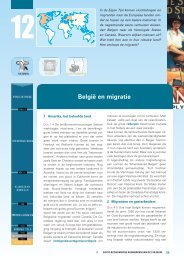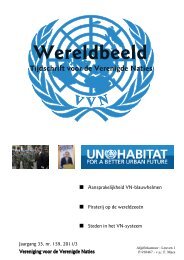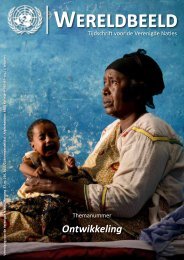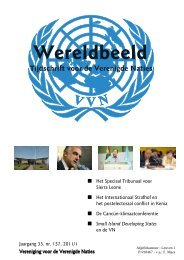Annex 5: United Nations Security Council Resolution 1874 (2009)
Annex 5: United Nations Security Council Resolution 1874 (2009)
Annex 5: United Nations Security Council Resolution 1874 (2009)
You also want an ePaper? Increase the reach of your titles
YUMPU automatically turns print PDFs into web optimized ePapers that Google loves.
<strong>Annex</strong> 5: <strong>United</strong> <strong>Nations</strong> <strong>Security</strong> <strong>Council</strong><br />
<strong>Resolution</strong> <strong>1874</strong> (<strong>2009</strong>) -<br />
Adopted by the <strong>Security</strong> <strong>Council</strong> at its<br />
6141st meeting, on 12 June <strong>2009</strong><br />
SECURITY COUNCIL, ACTING<br />
UNANIMOUSLY, CONDEMNS IN<br />
STRONGEST TERMS DEMOCRATIC<br />
PEOPLE’S REPUBLIC OF KOREA<br />
NUCLEAR TEST, TOUGHENS<br />
SANCTIONS<br />
<strong>Resolution</strong> <strong>1874</strong> (<strong>2009</strong>) Strengthens<br />
Arms Embargo, Calls for Inspection<br />
of Cargo, Vessels If States Have<br />
‘Reasonable Grounds’ to Believe<br />
Contain Prohibited Items<br />
The <strong>Security</strong> <strong>Council</strong> today condemned in the strongest terms the 25 May nuclear test by the<br />
Democratic People’s Republic of Korea and tightened sanctions against it by blocking funding for nuclear,<br />
missile and proliferation activities through targeted sanctions on additional goods, persons and entities,<br />
widening the ban on arms imports-exports, and calling on Member States to inspect and destroy all<br />
banned cargo to and from that country -- on the high seas, at seaports and airports -- if they have<br />
reasonable grounds to suspect a violation.<br />
Unanimously adopting resolution <strong>1874</strong> (<strong>2009</strong>) under Chapter VII, the <strong>Council</strong> sharpened its<br />
weapons import-export ban on the Democratic People’s Republic of Korea enacted in resolution 1718<br />
(2006) -- which included armoured combat vehicles, large calibre artillery systems, attack helicopters,<br />
warships and missiles and spare parts -- by calling on States to inspect, seize and dispose of the items<br />
and by denying fuel or supplies to service the vessels carrying them.<br />
The <strong>Council</strong> called on all States to cooperate with those inspections, and, if the flag State did not<br />
consent to inspection on the high seas, decided that that State should direct the vessel to proceed to an<br />
appropriate and convenient port for the required inspection by the local authorities.<br />
Any Member State that undertook an inspection, or seized and disposed of such cargo, was<br />
required to promptly submit reports containing the details to the Committee monitoring the sanctions,<br />
and to report on any lack of cooperation of a flag State.<br />
It asked the Secretary-General to set up a seven-member expert panel, for an initial one-year<br />
period, to assist the Committee in carrying out its mandate and, among other tasks, to gather, examine<br />
and analyse information from States, <strong>United</strong> <strong>Nations</strong> bodies and other interested parties regarding<br />
implementation of resolution 1718 (2006) and today’s text, particularly incidents of non-compliance.<br />
Small arms and light weapons were exempted from the inspections, but the <strong>Council</strong> called on<br />
States to exercise vigilance over the direct or indirect supply, sale or transfer to the Democratic People’s<br />
Republic of those weapons and directed States to notify the “1718” monitoring Committee at least five<br />
days prior to selling, supplying or transferring small arms or light weapons to it.<br />
In addition to implementing the asset freeze and travel ban imposed in paragraphs 8 (d) and (e)<br />
of resolution 1718 (2006), the <strong>Council</strong> today called on Member States to prevent the provision of<br />
financial services or the transfer to, through, or from their territory of any financial or other assets or<br />
resources that could contribute to the Democratic People’s Republic of Korea’s nuclear-related, ballistic<br />
missile-related or other weapons of mass destruction-related programmes or activities.<br />
It called on all Member States and international financial and credit institutions not to enter into<br />
new commitments for grants, financial assistance or concessional loans to that country, except for<br />
© <strong>2009</strong> – Dr. D. Criekemans – Negotiations in UNSC on the continuing security provocations by North Korea 40







